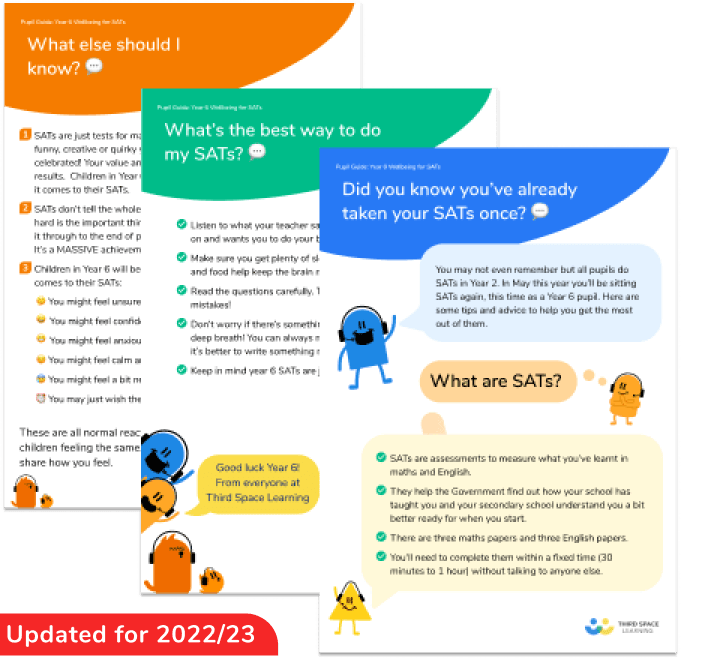How To Support Children Throughout KS2 SATs: Mental Health & Wellbeing Activities For Children
Ensuring primary school children had positive mental health around SATs, and a strong focus on their wellbeing was not common practice 20 years ago.
Today, primary school children face significantly different challenges. Their experiences with Covid-19, school closures and increasing test performance pressures impact their mental wellbeing.
SATS 2024: STAY UP TO DATE
Join our email list to stay up to date with the latest news and free resources for SATs 2024. As usual our expert teachers will be on hand to provide one to one tuition support, revision resources, expert analysis on papers and the 2024 SATs results.
In 2014, Public Health England confirmed that positive health and wellbeing, including mental health, are crucial for a child’s flourishing, thriving, and achieving. This means educators must equip children with skills such as resilience, self-awareness and self-belief to navigate challenges at school and beyond.
This is especially important for Year 6 students preparing for SATs and transitioning to secondary school. However, a 2016 NUT survey found that 90% of teachers and headteachers believed SATs preparation at key stage 2 has a ‘harmful impact on children’s self-confidence and mental health.
Additionally, a 2016 poll from the Association of Teachers and Lecturers found that children as young as six suffer from exam anxiety.
But there are strategies schools can implement to improve the mental health, emotional wellbeing and self-confidence of young people throughout primary school from early years to Year 6.
FREE SATs Wellbeing Guide
Support Year 6 emotional wellbeing for KS2 SATs with this resource designed by experts.
Download Free Now!How can schools promote positive mental health?
It starts with a whole-school approach to mental health, clear communication with pupils and parents, and specific strategies before, during, and after SATs week. Here’s what you need to know.
Take a Whole-School Approach to Wellbeing Promoting positive mental health and emotional wellbeing should start in the foundation years and continue through to Year 6. This means schools should:
- Set a culture of openness about mental health and regularly communicate its importance to staff, students and parents
- Teach coping skills early on, like how to express emotions healthily and manage difficult feelings
- Involve parents and providing them with tools to support their children’s wellbeing
- Ensure staff feel supported and model good self-care practices
- Train staff to identify warning signs of stress and anxiety
Identifying the causes of primary school stress
More than ever, primary school children are feeling the stress and pressure of Year 6 SATs. In fact, the National Union of Teachers found that 76% of primary school teachers observed stress-related symptoms in pupils leading up to SATs.
Even when teachers try to reduce test pressures, the frequent mention of SATs can increase stress. Effective communication about mental health is crucial in mitigating this.
High-achieving pupils may experience stress if they do not meet their own expectations and those who struggle academically can often feel additional pressure.
Recognising signs of SATs-related stress in pupils is essential for timely intervention.
What are the signs of SATs stress?

Young children often struggle to verbalise their feelings, making it hard to identify stress. While not an exhaustive list, here are some potential stress indicators to watch for:
- Extreme emotional reactions to minor issues: disproportionate responses to small mistakes.
- Reluctance or refusal to attend school: persistent reluctance to go to school near SATs.
- Physical complaints: stomach aches, headaches, and other issues.
- Low self-esteem: negative self-talk such as calling themselves ‘stupid’.
- Changes in daily patterns: alterations in sleep and eating habits.
- Avoiding schoolwork discussions: reluctance to talk about schoolwork or SATs.
If teachers notice any change in pupils, they should initiate conversations with pupils, parents and further support if needed.
How to tackle SATs stress during the lead-up to exam week
The period before SATs can be stressful for children. Here are some strategies for teachers and parents to support pupils:
1. Reduce stress levels over the weekend
Encourage stress-free weekends with fun activities to help children relax. Over the weekend, teachers can set as little homework as possible, even none the closer SATs get.
2. Avoid adding pressure
Reassure children you are proud of their efforts, regardless of test results. Both parents and teachers should let children know early on that whatever happens in the tests, they are proud of them.
3. Put SATs into perspective
Remind children that SATs are just one part of their education and do not define their worth.
Reinforce that pupils should try their best but nothing bad will happen if they don’t get the results they want in their SATs.
4. Support with revision
Support children with revision. As educators know, teaching goes beyond the national curriculum in many ways. One of those ways is teaching children how to revise content once it has been taught. Find hundreds of free resources to help children revise before SATs in the Third Space Maths Hub.
5. Talk about their stress and listen
Engage children in conversations about their worries and listen to their concerns. This will help them find a solution to the worry or put it into perspective.
Listening to your pupil’s problems can alleviate stress in the run-up to the tests.
6. Communicate
Parents and teachers must communicate to understand what might be causing stress in children.
Teachers and parents should communicate regularly and keep an open dialogue if children feel stressed. Behaviours in the classroom and at home can highlight what is causing the stress.
7. Plan enjoyable activities ahead of and during SATs
Organise a fun activity the weekend before SATs to take children’s minds off the imminent exams, alleviate the stress and improve wellbeing.
During SATs week, teachers can include fun activities such as breakfast club with peers or fun outdoor revision activities between exams.
8. Highlight their strengths
Remind children of their talents and skills that SATs do not assess. Emphasis e the importance of skills in subjects SATs do not test such as history and PE.
Highlight other skills that make your pupils great that tests do not measure such as kindness, generosity and being a good friend.
9. Remind them SATs are brief
SATs take place over 4 days in May. Reassure children that once the week is over, so are the tests.
10. Use positive language
Replace negative phrases with growth mindset language. For example, ‘I can’t do this’ becomes ‘I am going to work hard to get better at this.”
and“I feel stupid” becomes “I only feel like this right now because I’m nervous about the tests.”
11. Discuss anxiety signs and symptoms
Help children articulate their emotions. Children may not know how to describe what they are feeling if it’s is their first experience of anxiety or stress.
Discuss the physical and mental effects of both anxiety and stress so they can articulate their feelings and ask for help.
Refer to this video from ChildLine which explains the above in child-friendly terms.
Managing stress during SATs week
If pupils are feeling the pressure during SATs week, these additional strategies can help:
1. Host a SATs breakfast
Eating breakfast amongst peers each morning before SATs can help calm nerves and distract from the imminent exams. While this is a little extra work for staff, the positive impact on pupils is huge.

2. Talk about stress and listen
Allocate time daily to listen to pupils’ worries. Use methods such as a worry box or circle time. Address worries anonymously as a class to ensure all concerns are heard.
3. Encourage relaxing activities
Whether it’s playing with the family dog, kicking a football around outside, or watching their favourite episode of a show, encourage pupils to spend some time each day during SATs week doing something they love.
4. Promote physical activities
Include physical exercise and fresh air during the day for pupils. This might include the daily mile or an extra 10-minute afternoon break in the lead-up to and during SATs week.
5. Maintain positivity
If children see adults remain positive during SATs week, pupils are more likely to remain positive too.
6. Encourage peer support
While not all pupils will always see eye to eye, it’s important to encourage them to support each other, particularly during a stressful period.
Planning in circle time or extra PSHE lessons during SATs week can help pupils express their feelings and alleviate stress.
7. Limit screen time
Advise pupils to limit their screen time, particularly before bed.
Consider sending letters home to parents to help with this or hold a meeting for parents about good practice during SATs week.
A good night’s sleep will help reduce stress and help pupils feel more alert during SATs week.

8. Arrive early to school
Holding a SATs week breakfast has benefits other than peers enjoying each other’s company.
When pupils arrive early to school, they have time to relax and prepare for the coming day. Rushing through the gates at 8.44am for an 8.45am start can add to an already stressful week.
Inviting pupils into class earlier for breakfast helps support a calm start to the morning.
9. Ensure pupils are prepared
Eliminate any extra worries that you can for pupils. Ensure they have all of the equipment they need for each SATs paper laid out on the table:
- Pens
- Pencils
- Protractor
- A rubber
- A ruler
- A sharpener
- A mirror for reasoning
- Tissues
10. Practise exam technique
During SATs week, focus on the exam technique rather than the content.
Remind pupils to read every question carefully before they answer, double-check their answers, and answer the questions they are comfortable with before attempting the others.
Managing Post-SATs Stress
Some pupils may continue to worry about SATs after the tests are over. While it may be lessened, it might not be gone entirely.
Monitor pupils to ensure they aren’t worrying about test performance and that they can enjoy their time before moving on to secondary school!
Here are some tips to help:
1. Remove revision items
Clear the classroom of any SATs revision resources and encourage pupils to do the same at home.
2. Promote relaxation and mindfulness activities
While there are still a few weeks left of school and parts of the curriculum left to learn, make some time for relaxing activities. This may include a post-SATs picnic in the playground, a game of rounders or mindful colouring.
3. Return to normal routine
Children love routines and SATs are anything but routine. Once they are over, return to as much of a normal classroom timetable as soon as possible to keep some structure within the school day.
5. Remind them that SATs are over
Reinforce the fact that SATs are finished and your pupils have done all they can.
Let them know that you are proud of them for sitting the tests and doing their best whatever the results are. Encourage them not to spend time thinking about them now.
For more tips and resources on emotionally healthy SATs prep, download our free Year 6 Wellbeing Guide.
DO YOU HAVE PUPILS WHO NEED MORE SUPPORT IN MATHS?
Every week Third Space Learning’s specialist primary maths tutors support thousands of students across hundreds of schools with weekly online 1 to 1 maths lessons designed to plug gaps and boost progress.
Since 2013 these personalised one to one lessons have helped over 150,000 primary and secondary students become more confident, able mathematicians.
Learn about the SATs revision programme or request a personalised quote for your school to speak to us about your school’s needs and how we can help.





